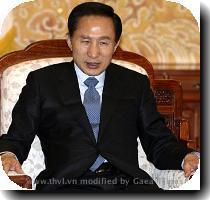Military tensions spike as South Korea holds anti-submarine drills, North scraps sea accord
By Kelly Olsen, APThursday, May 27, 2010
SKorea holds navy drill; NKorea scraps sea accord
SEOUL, South Korea — South Korean warships fired guns and dropped anti-submarine bombs in a large-scale military exercise Thursday, a week after Seoul accused North Korea of shooting a torpedo that sank a navy frigate in March.
The military pushed ahead with the show of force despite warnings from the North that the exercise would bring the peninsula to the brink of war.
North Korean reaction was swift. It declared it would scrap an accord with the South designed to prevent armed clashes at their maritime border, and warned of “immediate physical strikes” if any South Korean ships enter its waters.
A multinational team of investigators announced May 20 that a North Korean torpedo brought down the Cheonan, killing 46 sailors. Seoul announced a series of punitive measures, including slashing trade and resuming anti-Pyongyang propaganda over radio and loudspeakers aimed at the North.
North Korea has denied attacking the Cheonan on March 26 and said it would abandon a 2004 accord that covered disputed western waters where the Koreas have fought three bloody sea battles since 1999 and near where the Cheonan sank.
Inter-Korean political and economic ties have been steadily deteriorating since the February 2008 inauguration of South Korean President Lee Myung-bak, who vowed a tougher line on the North and its nuclear program. The sinking of the Cheonan has returned military tensions — and the prospect of armed conflict — to the fore.
Off the west coast, 10 warships, including a 3,500-ton destroyer, fired artillery and other guns and dropped anti-submarine bombs during a one-day exercise to boost readiness, the navy said.
South Korea also is planning two major military drills with the U.S. by July in a display of force intended to deter future aggression by North Korea, according to South Korea’s Joint Chiefs of Staff.
Gen. Walter Sharp, chief of the 28,500 American troops in South Korea, said the United States, South Korea and other members of the U.N. Command “call on North Korea to cease all acts of provocation and to live up with the terms of past agreements, including the armistice agreement.”
The U.S. fought on the South Korean side during the 1950-53 Korean War, which ended in an armistice, not a peace treaty. North Korea has long demanded a permanent peace agreement.
The prospect of another eruption of serious fighting has been constant on the Korean peninsula since the Korean War ended. But it had been largely out of focus in the past decade as North and South Korea took steps to end enmity and distrust, such as launching joint economic projects and holding two summits.
The sinking of the warship, however, clearly caught South Korea — which has a far more modern and advanced military than its impoverished rival — off guard.
“I think one of the big conclusions that we can draw from this is that, in fact, military readiness in the West Sea had become very lax,” said Carl Baker, an expert on Korean military relations at the Pacific Forum CSIS think tank in Honolulu, calling it nothing short of an “indictment” of Seoul’s preparedness there.
Now, South Korean and U.S. militaries are taking pains to warn the North that such an embarrassment will not happen again.
South Korean media reported Thursday that the U.S.-South Korean combined forces command led by Sharp raised its surveillance level, called Watch Condition, up a level from 3 to 2. Level 1 is the highest.
The increased alert level means U.S. spy satellites and U-2 spy planes will intensify their reconnaissance of North Korea, the JoongAng Ilbo newspaper said, citing an unidentified South Korean official.
The South Korean and U.S. militaries would not confirm any changes to the alert level. It would be the first change since North Korea carried out a nuclear test in May 2009, a South Korean Joint Chiefs of Staff officer said on condition of anonymity, citing department policy.
A South Korean Defense Ministry official said Seoul will “resolutely” deal with the North’s measures announced Thursday, but did not elaborate. He spoke on condition of anonymity, citing department policy. South Korea’s military said there were no signs of unusual activity by North Korean troops.
Despite the tensions, most analysts feel the prospect of a major war remains remote because North Korea knows what’s at stake.
“I don’t think they’re really interested in going to war,” said Daniel Pinkston, a Seoul-based analyst for the International Crisis Group think tank. “Because if it’s all-out war, then I’m convinced it would mean the absolute destruction” of North Korea. “And their country would cease to exist.”
Also Thursday, thousands of South Korean veterans of the Korean and Vietnam wars rallied in Seoul, beating a life-sized rubber doll of North Korean leader Kim Jong Il with wooden sticks and stabbing it with knives. “Dialogue won’t work with these North Korean devils,” said Mo Hyo-sang, an 81-year-old Korean War veteran.
In Moscow, the Kremlin said President Dmitry Medvedev has sent a group of experts to Seoul to study the findings of the investigation into the ship disaster.
“Medvedev considers it a matter of principle to establish the reason for the sinking of the ship,” it said.
Associated Press writers Hyung-jin Kim and Sangwon Yoon in Seoul, and David Nowak in Moscow contributed to this report.
Tags: Accidents, Asia, East Asia, Lee Myung-bak, North America, North Korea, Political Organizations, Seoul, South Korea, Transportation, United States, Veterans

